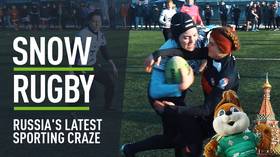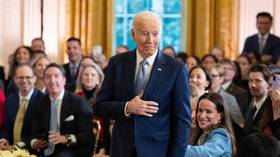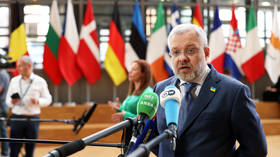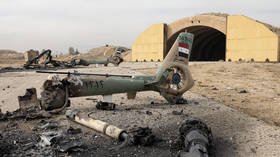From scrums to scrubs: Russian rugby referee talks work as nurse during Covid-19 pandemic

Rugby may have been kicked into touch by the Covid-19 pandemic but Russian referee Kristina Kokorina is not sitting idly on the sidelines, instead stepping up her work as a nurse.
Kokorina has swapped tackles for triage in her role as an intensive care worker at a local children's hospital in the city of Kirov, which lies just under 800km to the east of Moscow.
Kokorina is a former women's beach rugby champion, having helped her country to the European title in 2017 before embarking on a career with whistle in hand - in parallel completing her medical training.
Kokorina's budding refereeing ambitions had included officiating at international level for the first time this year, although those plans have now been put on hold by the Covid-19 pandemic.
The crisis has however seen Kokorina called into action of a different kind as she's increased her hospital work while Russia battles with the approaching Covid-19 peak in the country.
"I work as a nurse in the intensive care unit of the regional children's hospital in Kirov," Kokorina explained in an interview with RIA Sport.
"To be honest, before the start of the pandemic working at the hospital was a bit of a hobby for me...
"But now people in all areas have more free time because of the quarantine, so I decided I should work more and not just sit at home."
Kokorina's role at the children's hospital doesn't put her on the immediate frontline of Russia's coronavirus crisis, but as a healthcare worker she does have inside experience of how the battle is being waged.
"When the situation with the coronavirus began we had more work, but not because of the pandemic," Kokorina said.
"Maybe it just coincided with a lot of patients appearing at that moment, and when the re-profiling of hospitals for patients with coronavirus began.
"Now in our intensive care unit the situation has stabilized. There's free time, [but] I need to do something and so I decided work [more]."
Russia has so far suffered around 106,000 Covid-19 cases and just over 1,070 deaths. Moscow has seen the majority of cases, with more than 50,000 in the capital and surrounding region.
Kokorina said patients had arrived from the capital for treatment in Kirov, but that at present her region was coping.
"I wouldn’t say that the situation is critical. I generally look at the situation differently from how the media interpret it," she said.
"Yes, this is a serious virus, but I've probably seen enough more serious cases than coronavirus, I've seen a lot of patients who were really very ill.
"One percent mortality [for Covid-19], for me it's not so scary compared to what I see at work.
"But I'm not in center of the outbreak, I don't work with infectious patients," Kokorina admitted.
Also on rt.com Snow Rugby - Russia's latest sports craze aiming for Red Square (VIDEO)The rugby referee also revealed that people had turned to her for advice because of her medical background, assuming that she knows how best to combat the disease. She said she simply urges people to remain calm and do the basics.
"The most effective measures, no matter how trivial it might sound, are elementary precautions: wash your hands and wash everything that you buy, and don't touch your face with your hands. These measures can really help," she said.
"I try to ignore the panic. I try to explain everything calmly to anyone who calls me. But there are people who are almost ready to throw stones at the sick.
"We even had it [in Kirov]. There was a rumor going around the city about the person who was the first to bring the coronavirus to Kirov, people wanted to punish him.
"It's nonsense. Hysteria won't help, we have to get on with our work."
While Kokorina is keeping busy during the pandemic, she still laments the loss of rugby in her life.
"I'm gutted about it [the suspension of sport], because April should have been really busy for me with a lot of new starts...
"I'd love to believe that everything will get started as soon as possible, but I understand that some competitions will be canceled altogether.
"There are big logistical problems - where to hold tournaments, who will be ready to host them?
"I dread to even think about it. After the lockdown measures are lifted, people will need time to sort out their financial situations.
"There's a huge layer of amateur rugby players. People have lost jobs and income, how can they go to competitions?
"If professional clubs can start the season, even without spectators, then amateurs can start playing no earlier than autumn."
In the meantime, Kokorina's skills of a very different kind are needed as a healthcare worker during a crucial period for her city and country.
Also on rt.com 'They say it isn't a sport for women. I just smile': Meet Russia's women's beach rugby team












